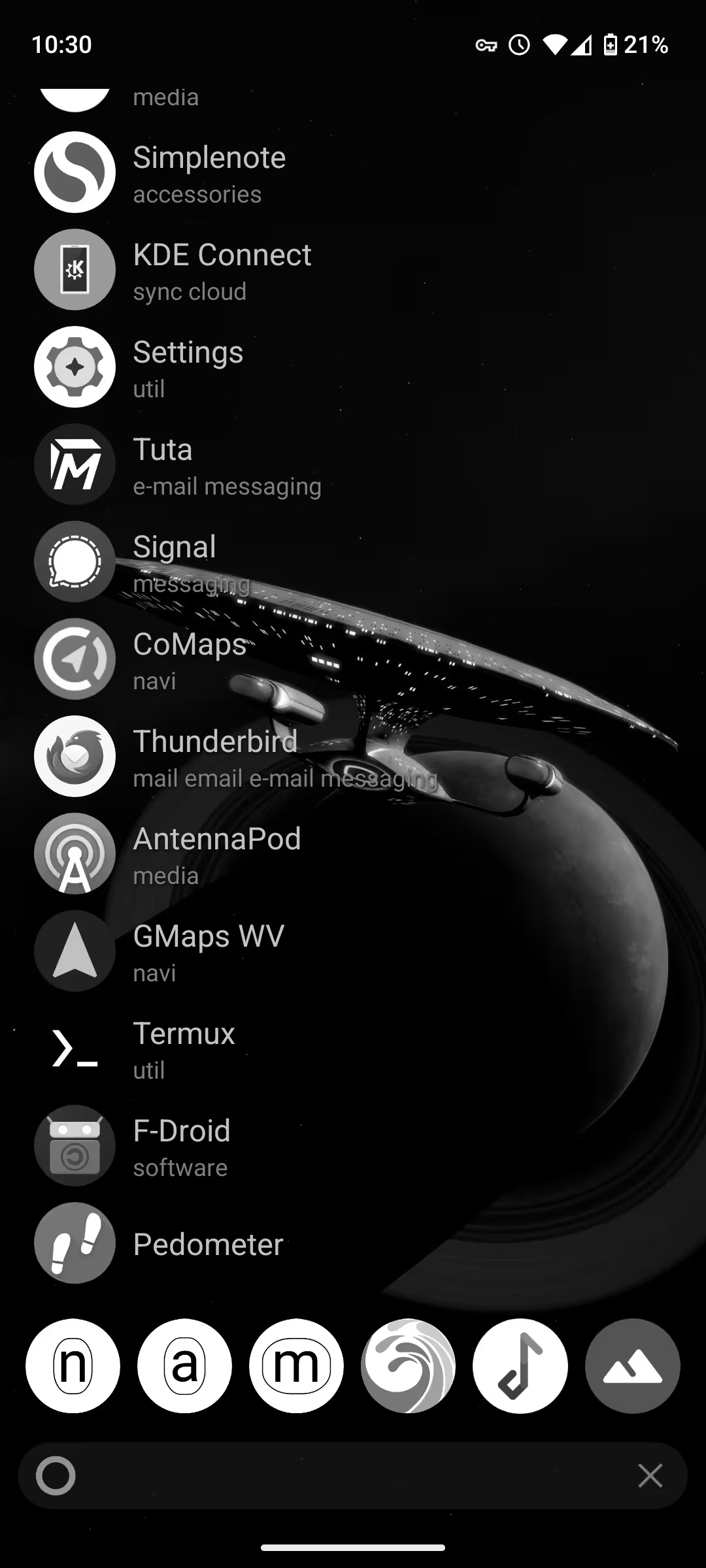Book mini-review: "Gulliver's Fugitives" by Keith Sharee
Thu 12 February 2026
Note: no substantive spoilers in this review
If you're short on time, you can skip the preamble
Preamble
As you will know from my previous blog post, I've been on a bit of a reading kick lately. I honestly hadn't read too many novels since I was in University last, and I had a lingering impression of myself as a very slow/poor reader that was actually really inaccurate. I guess reading goes a lot more quickly/enjoyably when you're not reading puffy scholarly articles laden with gratuitous, altiloquent phrases like "[X] qua [X]" and "the rôle of [X] in..."
I first got a copy of Gulliver's Fugitives (which is a Star Trek: The Next Generation novel) as an audiobook from my aunt when I was a teenager. Of course, this wasn't a digital audiobook, it came in the form of a single 90-minute cassette, read by none other than ST:TNG star Jonathan Frakes. I'm not certain, but I think it was my first ever audiobook, and it's honestly a really good one. While it's quite abridged, by a factor of about 5.5:1 (the full book is over 70,000 words, so an unabridged audiobook would be over 8 hours), it's an extremely enjoyable listen, with Frakes reading the text dramatically and in different voices (although he sadly doesn't try to replicate Sir Patrick's British accent 😄), and some actually neat audio "special effects." The audiobook is available DRM-free at libro.fm (please don't use Audible!)
I'm not exactly sure what mental process took place between the two decades of receiving the audiobook and buying the e-book, but at some point, I remembered the book, and wanting to read it unabridged, I purchased the e-book from Evil, Inc. in the fall of 2014. And then, of course, twelve years later, I finally sat down and read it this week, starting on Sunday and finishing yesterday.
Setup
I first bought the e-book right after purchasing an e-reader ahead of my first semester at University in 2014 (well, my first semester for my most recent attempt at getting a bachelor's degree, which was thankfully quite successful).
I still have that Kindle e-reader somewhere, but I couldn't find it when I wanted to read this book, so I decided to use my laptop instead.
Side note, please don't buy Kindle devices. They're horribly locked-down, and everything they sell is encumbered with DRM (a.k.a., lame copy protection that prevents you from reading it on the device of your choice).
Thankfully, there are ways to remove DRM from e-books, although they can be somewhat complex and fiddly to set up, as the sellers of digitally-maimed e-books like to engage in an arms race against the tools created to remove pointless copy protection from e-books.
So, I had my "legal" copy of Gulliver's Fugitives on my laptop in the open EPUB format, and read it on my laptop using my favorite reader program, Zathura. This was actually a far more pleasant experience than you'd think, as the laptop's screen is large and bright, and the laptop is comfortable to hold on your lap for extended periods of time while sitting on the couch. I know some people hate the idea of reading on a backlit screen, and I totally get that. I'm not saying everyone would enjoy the process, only that it didn't bother me. I still have my eyes on getting a Kobo e-reader, but I haven't pulled the trigger on that yet.
If you're wondering why I think a Kobo reader (which also uses DRM and some vendor lock-in) is okay, but a Kindle device is not, the answer is that while the Kobo is far from a perfect device, it's not as evil as the Kindle. There are ways of installing Free and Open Source reader programs on it, and it also has direct access to Library books via the Overdrive service. While Overdrive books are still DRM-encumbered, it's a free service, and there's a big difference to me between buying a book that you'll never own (because of DRM) and just checking out an equally-encumbered book from the Library.
Review
First of all, this author is a bit of a thesaurus. I've been logging dictionary lookups I make on my computer via the dictd utility, and I looked up over 70 unique words (11 of which were proper nouns/place names, or just too obscure for dictd 😄) while reading this book. Of course, in the 1990s, I probably would have just glossed over the unknown words without looking them up, and I don't think the author's vocabulary really hurt the enjoyment of reading the book. Wordsmiths may actually enjoy the challenge.
I couldn't find any other works by this author, and there is scant information about him online, although given how many results I saw listed from data brokers when I searched for "Keith Sharee" (no, I didn't use one of those horrid "services," or even visit their sites), I'm guessing that is the author's real name. There was a brief interview with the author in the May 1990 issue of the official ST:TNG magazine, which reveals that he studied a lot of mythology in preparing to write the novel (and it definitely shows), and that Data's "poetry" was created on an Atari computer, although it isn't revealed if it was an Atari 8-bit machine, or an Atari ST. I remember reading somewhere that the poetry was generated by a BASIC program, but I can't find a reference to that online. If so, it is of impressive complexity:
“The teachings of macaroon erotica doin’ a little thing we call three-toed minty-fresh logo tissue.
Quest for the Golden Aphids where they call the wind ‘Mr. Conceited-B-Gone.’
I walk down Spanked Mandrill Strasse with gently yielding fun-bladder under warranty.
Prometheus indicator-light blinking through the hydrogen eternity boo-boo.”
—Chapter three, about three pages down
Jonathan Frakes' dramatic reading of Data's "Poetry" on the audiobook was utterly fantastic. Highly recommend. 😄
The central theme that really grabbed me in the book, which I certainly wouldn't have understood as a teenager, nor appreciated until the past few years, is the struggle between chaotic creativity and rigid dogmatism. The citizens of Rampart are under an oppressive 1984-like regime where invasive brain scans are commonplace, and possession of any work of fiction is considered a capital offense. There is a scene in which Picard looks at a Rampartian Bible, and his reaction to it was a revelation to me:
“THIS BIBLE SETS FORTH the only true religion. All other religions and philosophies are hereby declared false and criminal.
“Everything contained in this Bible has been verified as factual truth, and is to be accepted as such, and in no other way, by the reader. Any interpretation of this Bible as metaphor, literature, or mythology is expressly forbidden.
“Violators will be subject to the full penalties as determined by the Council of Truth and enforced by Cephalic Security.
“To report criminal violations call this number toll free . . .”Picard leafed farther into the book. It was recognizable as a Rampartian revision of the Christian Bible. The Rampartians had annotated it throughout with “proofs” as to the “factual” nature of its “events.”
What confused people, he thought—they take what should be understood as a metaphorical story and they try to make it into science and history. They see a hand pointing a moral direction, and instead of looking to see where it points, they spend their time sucking on its finger and declaring to themselves, “It’s a finger, a finger, a finger.”
Picard closed the book solemnly and put it back where he had found it, on the table by his cot.
He looked up at the camera lens and brain wave antennae in the upper corner of the small white room.
That’s right, he thought defiantly. You heard me correctly.
—Chapter nine, at the very beginning
This analogy for, and criticism of the dogmatic and "factual" view of religion absolutely riveted me. How did this author in 1990 describe exactly how I'd feel in 2026 after a decade of repressive "religious" leadership in my country? Well, there's nothing new under the sun.
Category: Books Tagged: Bible Books Christianity Entertainment Ethics Life Non-technical post Personal favorites Philosophy Polemic Prose Science Fiction Writing


